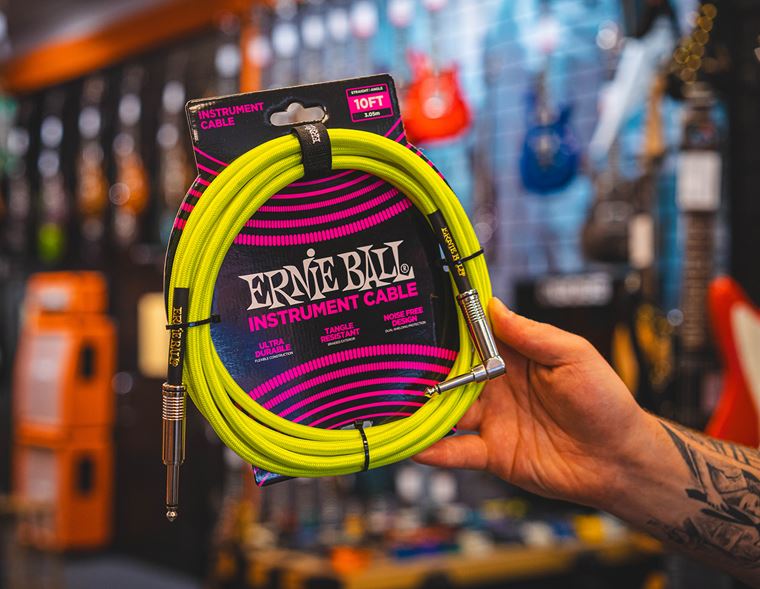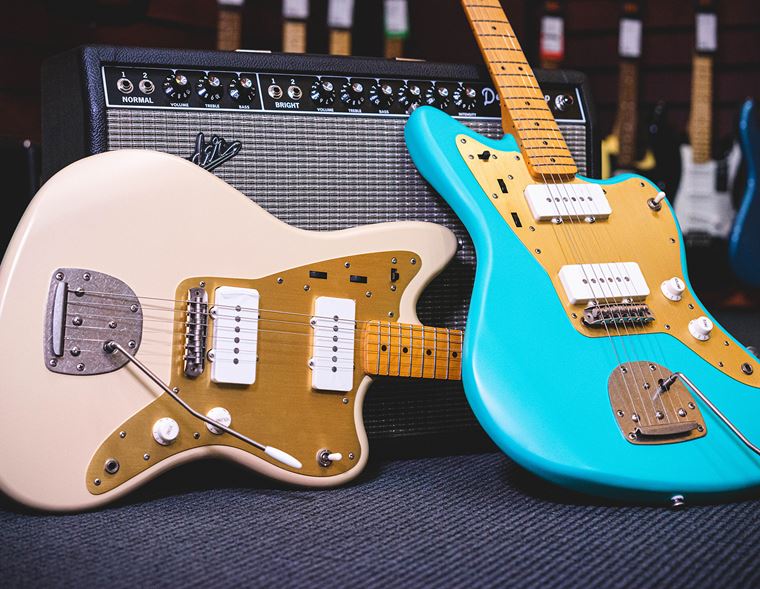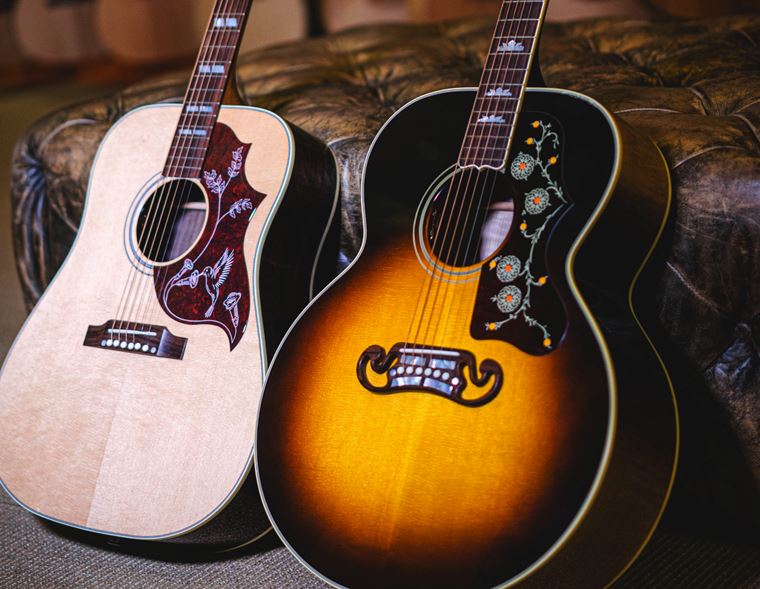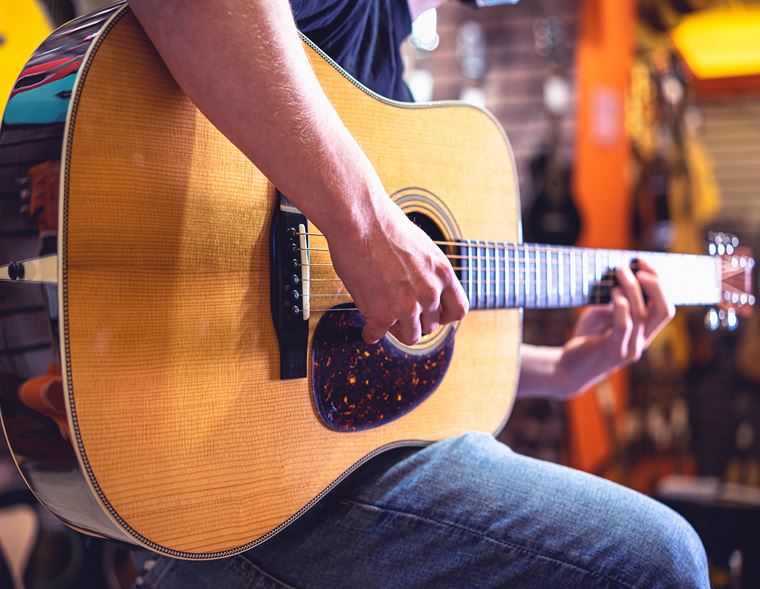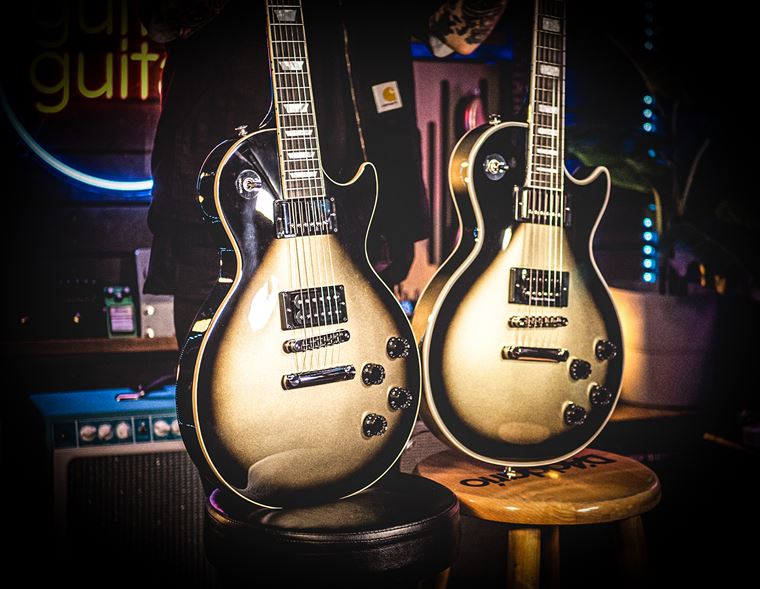Bored of Playing Guitar? Here's 10 Tips on How to Stay Motivated
Are you getting bored of playing the guitar? Is the gangrene setting in a bit?
Don’t worry, this happens to us all from time to time, and it’s a frustrating experience indeed. You know you love everything about the guitar, but sometimes it’s just not happening, and you feel flat and uninspired.
What to do when you are bored of guitar?
Well, we’ve got ten tips right here to help you get out of your playing rut. Check them out below, and try the ones that appeal to you!
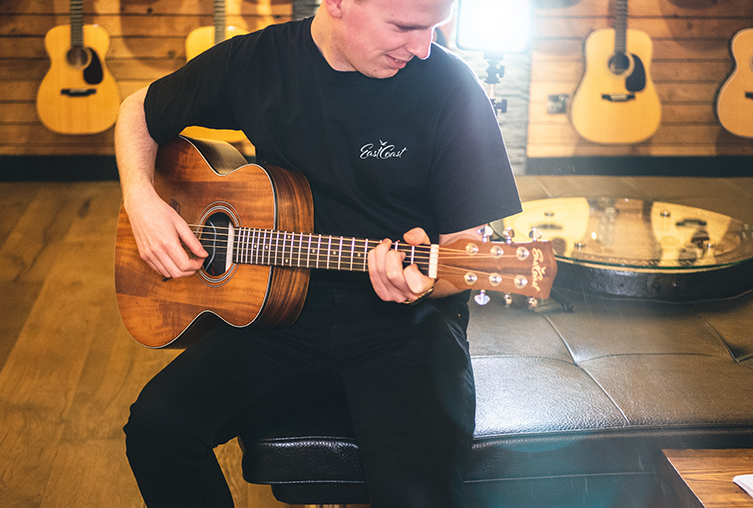
1. Take a Break
Just take a break. Stop playing for a little while! It may seem like heresy to say such a thing, but the more you force it, the more the struggle will just increase. Music is meant to be fun, so if the joy has temporarily fled your life, don’t assume that punishing yourself more will help bring it back.
Take a step back, find some other activities to take part in, and reapproach the guitar when the feeling comes back. Don’t worry about ‘when’, because you’ll just know, because it’ll feel natural to do so.
They say ‘a change is as good as a rest’ but we reckon a rest is as good as a change, too.
9. Learn a New Style
Are you a passionate diehard of a particular style or genre? Are you blues to the bone? Are you a die hard Trve-Metaller? Good for you, enduring passion is the lifeblood of all amazing art.
That said, maybe you’ve just been hearing too much of the same thing coming out of your amp and it’s kinda phased you a bit. Your fingers have learned to fall into the same automatic patterns, and you’re hearing the same old riffs and leads spewing out, session after session. It’s tedious and it’s dull, so nip that behaviour in the bud by looking at a completely new style to play.
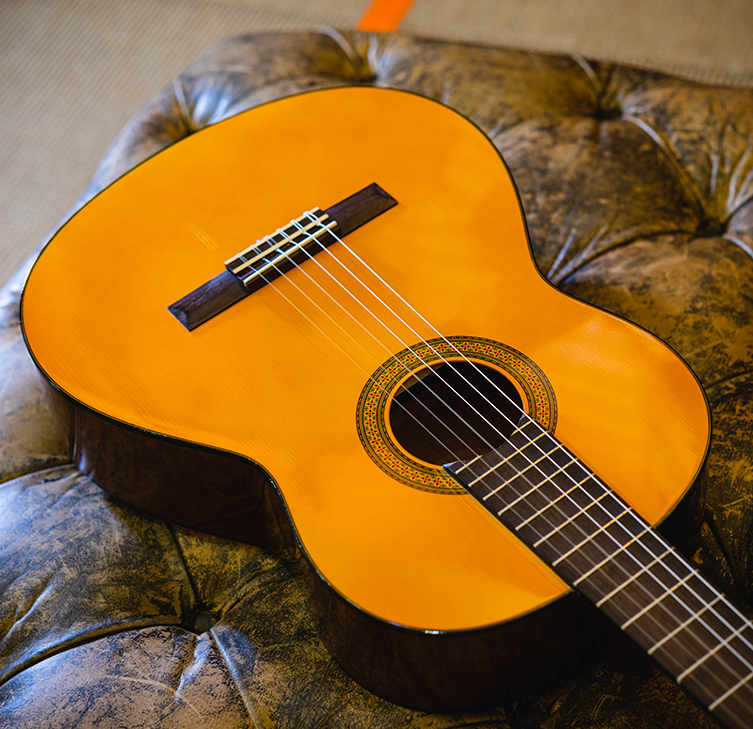
Find anything that resonates with you - even a little - and get playing! Practise, pay attention to what’s happening with your hands and see how you can incorporate these new moves into your existing style. It’ll make you a more unique and interesting player, plus it’s fun!
What styles to look at? Well, that depends entirely on what excites you, but if you mainly play rock and blues, then why not explore some country, jazz, flamenco, Cuban son, African highlife, New Orleans funk or full-on classical, to name but a few? You’ll learn things about rhythm, timing, phrasing, melody and harmony that may not ever have occurred to you otherwise.
8. Try a Different Instrument
Picking up a different instrument to play does a number of things for us as musicians. Firstly, it puts us far outside our comfort zone, forcing us to reassess how we approach music, and teaching us to listen to what we’re doing again, since we’re no longer on autopilot.
Secondly, it allows us to hear chords and notes in a new, fresh context. This alone can be enormously useful to us, since even simple progressions played on, say, a piano, will sound profoundly different to those chords on the guitar. Different instruments just have access to different clusters of notes, not to mention different pitch ranges, timbres and playing techniques.
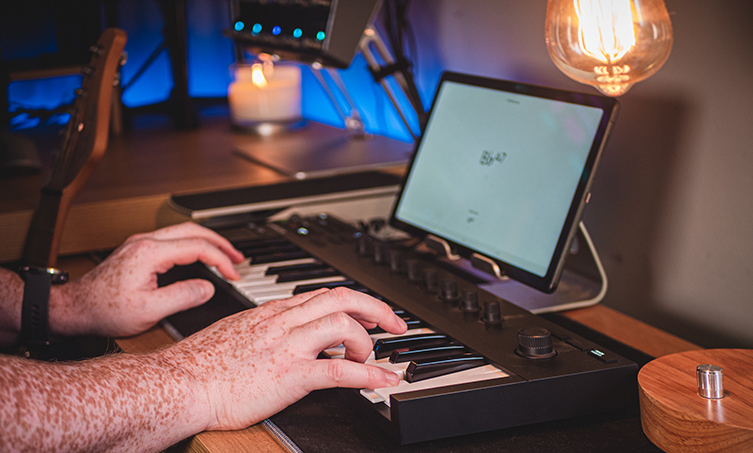
Lastly, playing a different instrument will often bring you a rediscovered respect and excitement for your own skillset on the guitar. Trying an instrument you’re not very good at playing instantly shows you how good you are on your primary one, and that in itself can be very motivating. You’ll go back to it feeling immediately more capable, masterful and excited because it’s an instrument you already have a hard-earned command over. After spending time as a rookie on a different instrument, you’ll appreciate how far on you are as a guitarist.
7. Play With People
Grab your guitar, go out and find other people to play with. Whether it’s an informal muck about with friends, a jam night in a pub or something more akin to a ‘proper’ band practice, the act of playing with (and playing for, let’s be clear) other humans is a huge way to ignite your interest back into the guitar.
Why? Well, the context dictates that you can’t stop and start when you mess up, since you’ll be mid-song with other players! This encourages you to be more present and focussed on what you’re doing. You’ll also be taking turns to be the centre of attention and then a supporting player, which can do lots to bring context and variety to your playing and technique.
Playing with other musicians makes you play more often at your A-game, whilst simultaneously upping your game. It’s essential, in other words.
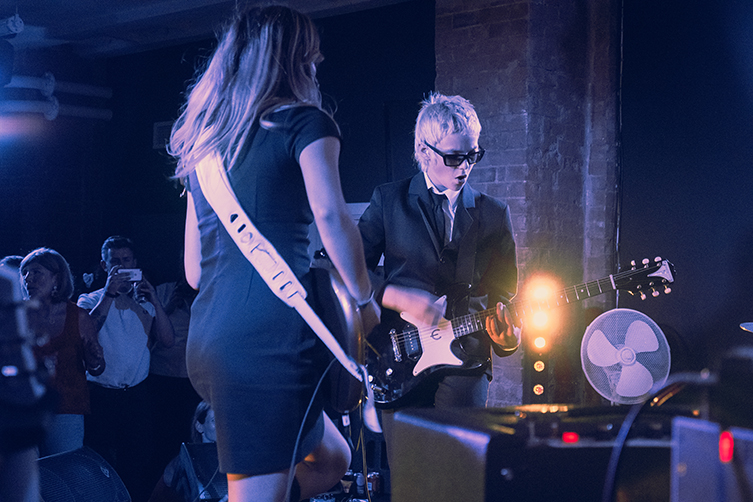
6. Play With New People
Playing with other people is great, but maybe you’re stuck in a rut because you are thoroughly sick of playing with the same three or four people? Week in, week out, it’s the same tunes, the same drum patterns, the same vocal inflections, the same complaints…it’s all just getting a bit old.
Time for some fresh blood! Find another group or band to play with, even as an adjunct to your main band or project. You don’t have to start a new band or anything as high falutin’; just be in a room with new people, in a musical context. You’ll be presented with musical situations you haven’t been in before, and this experience can’t help but re-energise you accordingly.
It may even make your usual suspects shine more favourably in comparison, who knows?
5. Practice Something Difficult
It could be that you’ve plateaued as a player. You’ve reached a good skill level and can impress your friends and family, maybe even the locals at the weekly blues jam. But you’ve long since stopped seeking out pieces that will increase your skills. This has led to a slowly creeping frustration, a feeling that you’ve hit a ceiling in your playing experience.
Well, it’s time to break through those limits! Hard work and dedication are needed. You need to focus all of your attention on learning a piece of music that’s currently beyond your reach, skill-wise. It’s time to pick something ridiculous, dig in and practise, practise, practise until you fully get it.
It’s not even a shred thing: this could be gypsy-jazz, or flamenco, or any other demanding piece of music that makes you up your game in order to tackle it. No excuses!
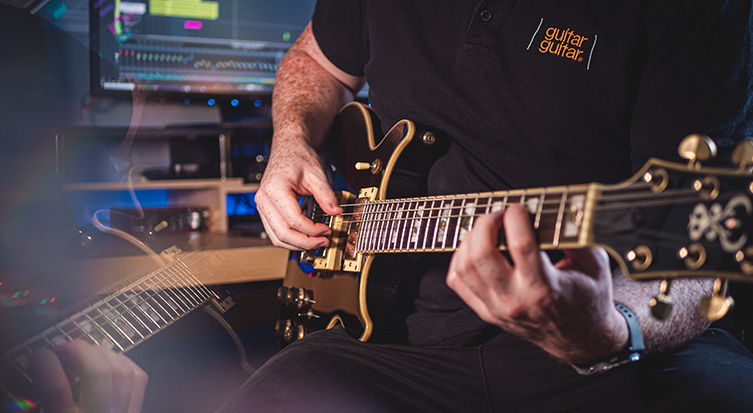
5. Play Something Easy
This may sound counterintuitive - particularly given our last tip - but maybe you’re trying too hard and it’s killing your fun? If all you do is practise, practise, practise, it can really kill the joy that should be inherent when playing an instrument. If this sounds like you, then we suggest taking the other road. Play something really easy.
We’re talking about three chord punk tunes, or classic pop. Something that will in no way tax your skills, but instead give your subconscious a real sense of achievement. Running through songs that you can definitely play is well worth doing if you aren’t in the habit of it. We’d say that it’s a bit of an issue if this is all you ever do (see our previous tip about pushing your skills), but flying through some of your favourite pop punk hits can feel like a real breath of fresh air once in a while. A bit of both is required!
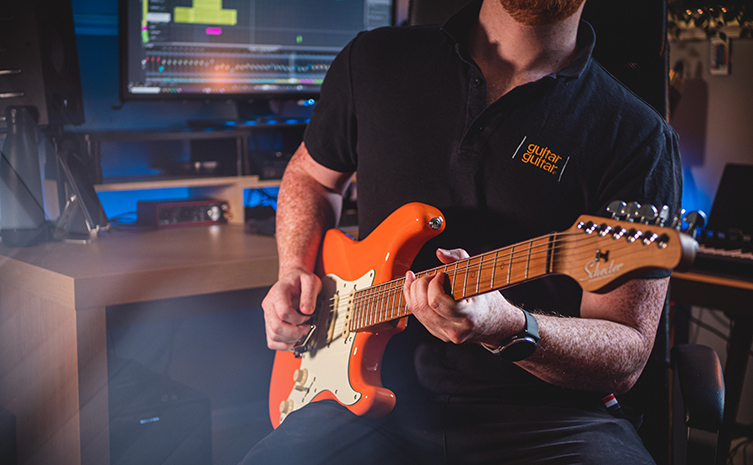
4. Try a New Tuning
Nothing gets a guitarist out of their comfort zone quicker than an alternate tuning. All of a sudden, everything you’d normally automatically play stops working, and you’re forced to reconsider and adapt.
Drop-D is a simple way to reinvigorate your riff writing, but that’s hardly a huge departure from standard tuning, is it? Let’s do better. Try Open G or DADGAD for slightly less familiarity, whilst not being completely alien.
Suddenly finding that your usual bag of tricks won’t apply to the tuning you’ve found yourself in, you’ll instead forge a path into some new ground. Whether that ground is good or bad (or indeed new) is beside the point: your mission to reignite your mojo will have most pointedly worked! You’re back!
3. Try a New Pedal
Try plugging a new pedal in and let it have it’s way with your sound for a while.
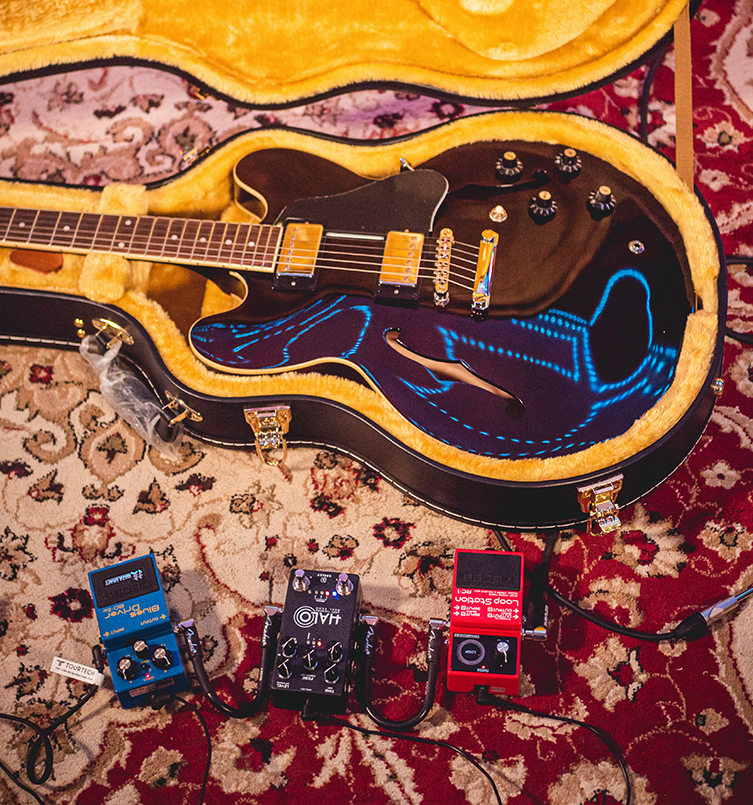
It could be something as simple as a new overdrive that you’ve always wanted to have a shot of, or you could play ‘outside the box’ and get something more extreme. The point of the exercise is to engage with your guitar in a new way. Even if your fingers still reach for those same notes and shapes, the sonic difference created by the new pedal could bring inspiration all by itself.
2. Learn Non-Guitar Music on the Guitar
Have you ever listened to a piano part or saxophone solo and loved what you’ve heard? Why not take some time to learn it on the guitar? It’s a very different experience to learning a guitar solo on the guitar.
Even taking those two instruments as examples, you’ll find that the piano uses chord voices that are unusual when applied to the guitar. We mentioned this earlier, but it bears further explanation. For example, it’s difficult to get a 3rd in with standard chord shapes on the guitar, but you can easily swap out the root note of the chord for the 3rd instead, and have the chord’s root note represented by its equivalent note an octave higher. (Quick example: play an open A chord with a Csharp on the 4th fret of the A instead of the open note.)
The saxophone, by comparison, is a linear instrument in terms of its note-playing, but it is also capable of making huge leaps in terms of note intervals. This is something you can directly apply to guitar playing, and will have your hands reaching for shapes that are far from standard.

1. Re-energise Your Guitar Habit
So, those are our top ten tips for de-funking your guitar malaise. We all get it from time to time, but by adopting these simple strategies, you’ll hopefully power through the ennui and find fresh pastures of enjoyment and inspiration. Good luck!


